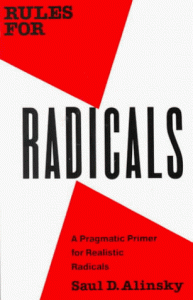
Try – S
I’m reading Saul Alinsky’s Rules for Radicals tonight. It’s a very good book, that doesn’t feel the slightest bit dated despite having been written 40 years ago.
It’s a great book, mostly for the way that Alinsky is capable of demonstrating an undying optimism about the human spirit, while still remaining thoroughly grounded in the difficult and unyielding world of real problems. He, better than pretty much anyone else I’ve ever read, manages to explain the utter futility of abstract ‘means vs. ends’ debates, recognizing that in any conflict both sides will always believe themselves to have morality on their side. The important matter, for him, can never be simply sorting out who genuinely wields the moral force–because such an argument presumes that someone standing outside of the conflict is capable of passing judgment–but that third party is always definitionally abstracted from the force of the controversy.
But, very importantly, he doesn’t just say this gives us leeway to think any old thing we want or to use any means we choose. He asks us to feel a constant sense of anguish at the impossibility of knowing. He cautions against any system of thought that gives us easy answers to the question of whether the ends justify the means. We should instead ask whether these particular ends justify this particular means.
Perhaps it’s just a function of academic specialization–where you start to read everything you encounter through the lens of your own research–but I see a lot Schmitt in this book. And that’s actually encouraging to me. I’m constantly troubled by what it’s possible to do with Schmitt’s arguments about the essential nature of the friend/enemy distinction and the problem posed by emergency–and it’s comforting to see a thinker from the radical left taking these same problematics and employing them for good rather than evil.
In particular, I like his take on compromise. It seems to capture what I find most vibrant and powerful about the values of modern liberalism–but it does so from a perspective that is all too aware of the dangers that come from imagining politics to be simply a game of ideas and abstract norms:
If you start with nothing, demand 100 per cent, then compromise on 30 per cent, you’re 30 per cent ahead. A free and open society is an on-going conflict, interrupted periodically by compromises—which then become the start for the continuation of conflict, compromise, and on ad infinitum…A society devoid of compromise is totalitarian. If I had to define a free and open society in one word, the word would be ‘compromise.’
Compromise here doesn’t mean an acceptance of the other position as right; it does mean, however, a recognition that the churn of conflict is only valuable when it can be translated into tangible gains. What you end up getting is never enough. In part because other people get in the way. But also, in a broader sense, because society isn’t ABOUT perfection; it’s about a lot of individual people doing their best to get what they want, and that entailing a lot of different opinions. Individuals must seek their own desires, but society only works when it finds a balance among them. That doesn’t mean you should ever stop trying–but it does mean that you have to temper your endless struggle with a recognition that the perfect world you imagine can only ever be an idea. But it’s an idea worth striving for–and so you do.
That’s a nice balance of the pessimistic and the hopeful, of reality and dreams, I think.

It’s always encouraging to read the one blog in thousands whose author has actually read “Rules” and understood it. A lone voice in the wilderness is still a voice against the wind.
Sorry for the typo – it happens sometimes when I type fast…